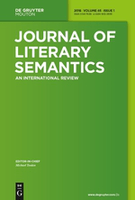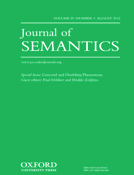
JOURNAL OF LITERARY SEMANTICS
Scope & Guideline
Elevating Scholarly Discourse in Literary Semantics
Introduction
Aims and Scopes
- Cognitive Stylistics:
The journal emphasizes cognitive stylistics, examining how readers process literary texts and the cognitive mechanisms that underlie their understanding and emotional responses. - Narrative Techniques and Empathy:
A central theme is the analysis of narrative techniques, particularly how authors manipulate narrative structures to evoke empathy and emotional engagement from readers. - Intertextuality and Cultural Contexts:
The journal explores intertextual relationships within literary works and how cultural contexts shape meaning, focusing on the interplay between texts and their socio-cultural environments. - Ecostylistics and Environmental Narratives:
Recent publications highlight ecostylistics, analyzing how literature reflects and influences perceptions of the environment, emphasizing the relationship between language, place, and ecological awareness. - Poetic and Aesthetic Cognition:
The exploration of aesthetic cognition in poetry is a significant focus, investigating how literary forms and devices contribute to the construction of meaning and emotional experiences.
Trending and Emerging
- Empathy and Reader Engagement:
Recent publications show a growing interest in how narrative strategies foster empathy and emotional engagement, reflecting broader cultural conversations about the role of literature in understanding human experiences. - Digital Narratives and New Media:
Emerging themes surrounding digital fiction and transmedial narrative theory are becoming prominent, exploring how digital formats and technologies influence storytelling and reader interaction. - Ecostylistics and Environmental Discourse:
There is an increasing focus on ecostylistics, examining how literary texts engage with ecological issues, which resonates with global environmental movements and the need for sustainable narratives. - Cognitive Approaches to Literary Analysis:
Cognitive approaches are gaining traction, with researchers employing theories of mind and perception to analyze how literary texts shape understanding and influence readers' cognitive processes. - Multimodal Analysis in Literature:
The journal is seeing a rise in studies that incorporate multimodal analysis, focusing on how different media and modes of expression work together to create meaning in literary contexts.
Declining or Waning
- Formalism and Structuralism:
There seems to be a waning interest in strictly formalist and structuralist approaches, as more researchers gravitate towards cognitive and empirical methodologies that account for reader response and social contexts. - Historical Narratology:
Themes centered around historical narratology are less frequently addressed, indicating a shift towards contemporary analyses that prioritize current cultural and social dynamics over historical frameworks. - Traditional Literary Criticism:
There is a noticeable decline in traditional literary criticism that does not incorporate cognitive or semantic perspectives, as the journal increasingly favors interdisciplinary approaches that integrate psychology and cultural studies.
Similar Journals

BULLETIN HISPANIQUE
Charting New Territories in Hispanic StudiesBULLETIN HISPANIQUE, published by PRESSES UNIV BORDEAUX, is a prominent academic journal dedicated to the interdisciplinary exploration of literature, linguistic studies, and historical analysis related to the Spanish-speaking world. Since its inception in 1972, the journal has established itself as a vital resource for researchers and scholars, achieving notable recognition across various categories—most recently characterized as Q2 in History, Q3 in Linguistics and Language, and Q1 in Literature and Literary Theory for the year 2023. Though it operates under traditional access models, BULLETIN HISPANIQUE maintains a commitment to scholarly excellence, offering insightful articles that contribute to the rich tapestry of cultural and linguistic discourse. With its Scopus rankings reflecting significant academic engagement, the journal serves as an essential platform for dialogue and discovery in the arts and humanities, appealing to a diverse audience of students, professionals, and academics committed to advancing knowledge in these vital fields.

Skandinavskaya Filologiya
Illuminating the Nuances of Nordic Linguistic Traditions.Skandinavskaya Filologiya is a distinguished academic journal published by St Petersburg University Press that specializes in Scandinavian philology and linguistics. With its ISSN 0202-2397 and E-ISSN 2618-9518, this journal serves as a vital platform for scholarly articles that explore the intricate languages, literature, and cultural nuances of the Scandinavian region. The journal seeks to promote interdisciplinary research and foster collaboration among linguists, literary scholars, and cultural researchers interested in the rich heritage and contemporary developments within Scandinavian studies. Although the journal operates without open access, it is committed to enhancing academic discourse and providing a valuable resource for students, professionals, and researchers. Located in the vibrant city of St Petersburg, Russia, the journal aims to bridge the gap between Eastern and Western scholarship in Scandinavian philology, making it a significant contributor to the field.

Zbornik Matice Srpske za Slavistiku-Matica Srpska Journal of Slavic Studies
Bridging Cultures Through Slavic ScholarshipZbornik Matice Srpske za Slavistiku - Matica Srpska Journal of Slavic Studies, published by Matica Srpska in Serbia, is a prominent academic journal focusing on the diverse and rich field of Slavic studies. With an ISSN of 0352-5007 and a commitment to advancing knowledge in linguistics, literature, and cultural contexts, this journal serves as a vital resource for researchers, professionals, and students alike. Although designated as an open access journal, its significance is highlighted by its ranking in the lower quartiles of 2023 across various categories, including Q4 in Linguistics and Language and Q3 in Literature and Literary Theory. The journal's Scopus rankings further reflect its position, with a percentile of just 8th for Language and Linguistics. These factors underscore the journal's ongoing contribution to Slavic scholarship from 2019 to 2024, fostering dialogue and exploration in a field that remains crucial for understanding Eastern European cultures and languages.

Revista de Letras Norte@mentos
Empowering Voices in the World of LiteratureRevista de Letras Norte@mentos is an esteemed academic journal published by UNIV ESTADO MATO GROSSO, focusing on the rich field of literature and linguistics. With its ISSN of 1983-8018, this Open Access journal has been granting unrestricted access to readers since 2008, fostering an inclusive environment for the dissemination of scholarly research within the literary community. Based in Brazil, specifically at AV TANCREDO NEVES 1095, CAVALHADA II, CACERES, MT 78200-000, the journal embraces diverse perspectives and discussions surrounding literary theories, cultural studies, and the evolving landscape of language. Although specific metrics such as the HIndex and Scopus ranking are currently not listed, the journal aims to establish a strong presence in the literary field, appealing to researchers, professionals, and students who are committed to advancing knowledge and insight. By promoting high-quality research and facilitating academic dialogue, Revista de Letras Norte@mentos plays a vital role in the ongoing exploration of literature and its impact on society.

Sibirskii Filologicheskii Zhurnal
Exploring Cultural Narratives Through Scholarly InsightSibirskii Filologicheskii Zhurnal is a prestigious academic journal published by the Russian Academy of Sciences, Institute of Cytology and Genetics. With ISSN 1813-7083, it is dedicated to advancing research in the fields of Cultural Studies, Linguistics and Language, and Literature and Literary Theory, and has achieved notable rankings, including Q2 in Cultural Studies and Linguistics, and Q1 in Literature for 2023. The journal provides a platform for scholarly discourse, contributing valuable insights to its fields with an evolving scope that spans from 2018 to 2024. Though not an open-access journal, Sibirskii Filologicheskii Zhurnal serves as a vital resource for researchers, professionals, and students in the Russian Federation and beyond, fostering a deeper understanding of linguistic and literary phenomena. Its commitment to high-quality content makes it an essential addition to any academic's library.

Etudes Romanes de Brno
Cultivating a Rich Exchange of Scholarly PerspectivesEtudes Romanes de Brno, published by Masaryk University, Faculty of Arts, is a distinguished academic journal that has been contributing to the fields of Linguistics and Language as well as Literature and Literary Theory since its inception. With an ISSN of 1803-7399 and E-ISSN 2336-4416, this open-access journal has been a valuable resource for scholars since 2009, enhancing accessibility to a broad audience of researchers and students in the Czech Republic and beyond. The journal's impact is underscored by its categorization in the Q2 and Q3 quartiles for literature and linguistic studies as of 2023, reflecting its commitment to rigorous academic discourse. With Scopus rankings placing it in the 57th and 31st percentiles for its respective fields, it continues to attract high-quality submissions that explore contemporary issues in literary studies and language analysis. Etudes Romanes de Brno promises to remain an essential platform for the exchange of scholarly ideas, fostering growth and innovation in the humanities.

Journal of Semantics
Exploring the Depths of Meaning and Language.Journal of Semantics, published by Oxford University Press, is a prestigious academic journal that stands at the forefront of the fields of Artificial Intelligence, Linguistics, and Arts and Humanities. With an impressive Impact Factor and ranking among the Q1 quartiles in its respective categories as of 2023, this journal caters to researchers and practitioners committed to exploring the intricate relationships between meaning, language, and computational models. The journal is indexed within the Scopus database and ranks highly, indicating its significant contribution to academic discourse. With a timeline spanning decades from 1982 to 2024, the Journal of Semantics aims to publish high-quality, innovative research articles that stimulate rigorous debate within the semantic community. Although it does not currently offer Open Access options, the journal's physical and digital presence ensures it reaches a wide readership.

Letteratura e Letterature
Exploring the Depths of Literary and Linguistic Theory.Letteratura e Letterature is a distinguished scholarly journal dedicated to exploring the nuances of literature and linguistic theory, published by FABRIZIO SERRA EDITORE. This journal, identifiable by its ISSN 1971-906X and E-ISSN 1973-2600, serves as a significant platform for researchers, professionals, and students engaged in critical discourse within the fields of Literature and Linguistics. With a focus on fostering interdisciplinary dialogues, it seeks to illuminate diverse literary phenomena and linguistic intricacies, contributing meaningfully to the academic community. Despite being categorized in the Q4 and Q3 quartiles in 2023, the journal remains a vital resource, encouraging innovative scholarship and broadening the understanding of literary and linguistic interactions. Although it does not currently offer open access, the journal promises rigorous peer-reviewed content, ensuring the quality of published research. Operating from its base in Pisa, Italy, the journal continues to embrace its converged years from 2014 to 2021 and the ongoing 2023 to 2024 period as an era for refined scholarship and vibrant academic exchange.

Dacoromania
Bridging ideas and cultures through language and literature.Dacoromania, published by the esteemed EDITURA ACAD ROMANE, is an Open Access academic journal that has been contributing to the fields of Linguistics, Language, Literature, and Literary Theory since 2011. With a mission to foster scholarly dialogue and facilitate knowledge dissemination, the journal enables researchers, professionals, and students to access a wealth of innovative research and critical scholarship without barriers. Although currently classified in the Q4 quartile for its categories in Linguistics and Literature, Dacoromania aspires to enhance its visibility and impact within these disciplines, providing a platform for emerging voices and ideas from Romania and beyond. The journal is openly accessible and invites submissions that push the boundaries of linguistic and literary studies, ensuring a vibrant exchange of thought in a rapidly evolving academic landscape.

Acta Universitatis Lodziensis Folia Litteraria Romanica
Exploring the Depths of Language and Literary TheoryActa Universitatis Lodziensis Folia Litteraria Romanica is a distinguished open-access journal published by LODZ UNIV PRESS since 2016, dedicated to advancing scholarship in the realms of Linguistics and Literature and Literary Theory. With a strong commitment to disseminating high-quality research, the journal serves as a vital platform for scholars and practitioners aiming to explore the complexities of language and literary studies. It is positioned within Q4 in Linguistics and Language and Q3 in Literature and Literary Theory, evidencing its growing influence in these fields. The journal's inclusion in the Scopus rankings, with notable placements in both the Arts and Humanities and Social Sciences categories, underscores its relevance and engagement with contemporary discourse. Located in Poland, the journal encourages contributions from a diverse range of voices and perspectives, promoting scholarly dialogue and innovation, while adhering to an open-access format for enhanced accessibility. Researchers, professionals, and students will find Acta Universitatis Lodziensis Folia Litteraria Romanica an invaluable resource for their academic pursuits.